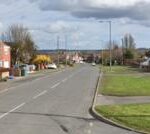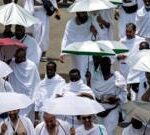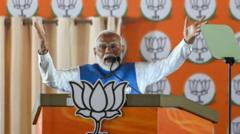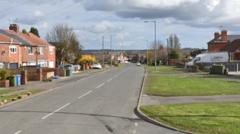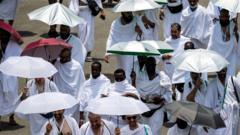India’s Modi could win third term, polls predict
25 minutes agoCherylann Mollan,BBC News, MumbaiGetty ImagesMr Modi’s BJP is on course to win the election, exit polls say
India’s Prime Minister Narendra Modi is likely to win a third consecutive term in office, exit polls suggest.
Analysts warn the polls, released by various news agencies, have often been wrong in the past and are not impartial.
However, they have placed Mr Modi’s Bharatiya Janata Party (BJP) as the frontrunner in the general election.
The BJP, the main opposition Congress party and regional rivals battled it out in a fierce campaign over seven phases of polling.
Results will be announced on 4 June.
A party or coalition needs 272 seats in parliament to form a government.
The BJP led-coalition, the National Democratic Alliance (NDA), will cross this target – according to exit polls.
If Mr Modi wins, he will be only the second prime minister in India to hold office for three consecutive terms. The first to do so was Jawaharlal Nehru, India’s first PM.
Getty ImagesIndia’s main opposition Congress has accused the BJP of silencing opponents, which the BJP denies
What are the exit polls saying?
Prime Minister Modi came into this election with resounding popularity, but his main rival – the leader of the Indian National Congress, Rahul Gandhi – and a coalition of opposition parties gathered significant momentum through the course of the lengthy election campaign.
Now an aggregate of six exit polls forecasts big wins for the BJP-led NDA, but such surveys are not always reliable.
Though the individual numbers vary, they predict that the NDA will get 367 seats.
The INDIA bloc is expected to get 143 seats.
On its own, the BJP may win 327 seats, not quite meeting its 370-seat target.
Getty ImagesMr Modi is one of the most popular leaders that India has seen in recent decades
A really big election
India is the world’s most populous country, with 1.4 billion people, and holding a nationwide election is nothing short of a Herculean task.
Some 969 million citizens were eligible to cast their ballot, which is equal to the populations of the US, Russia, Japan, Britain, Brazil, France and Belgium.
What made headlines this election?
Polling for the election, which concluded just hours ago, began on 19 April.
The season was marked by fiery speeches by politicians (some of them controversial), numerous rallies, diatribes, jibes and propaganda as political parties looked to outsmart their opponents – on the ground and even online.
And there wasn’t a dearth of headline-making incidents. Delhi Chief Minister Arvind Kejriwal’s arrest in a liquor policy case days before polling began drew sharp criticism from opposition leaders and even sections of the media.
Opposition leaders accused the BJP government of trying to silence rivals and deny them a level playing field – which the BJP denies.
A court granted Mr Kejriwal bail on 10 May to campaign for the elections. However, he has to return to jail on 2 June.
The election was also overshadowed by reports of politicians and party workers tampering with voting machines, Muslims being denied their right to vote in some areas and parties flouting the Model Code of Conduct – guidelines issued by the Election Commission of India (ECI) to ensure free and fair elections.
Opposition leaders also accused the commission of not acting on their complaints against the BJP – an allegation the ECI has denied.
Getty ImagesPolling in India is a mammoth exercise as millions queue up to vote in each phase
What did people vote for this election?
The inauguration of the Ram temple, which was one of the BJP’s biggest poll promises this election, and the government’s welfare schemes are expected to benefit the ruling party.
But the high unemployment rate and price rises, especially of food and fuel, were also at the top of many voters’ minds.
The election also came amid allegations from the opposition, activists and global rights organisations that Indian democracy is under threat. It is an issue that may have influenced the way people cast their votes.
Read more India election stories
